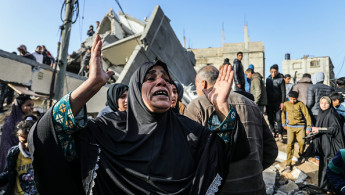Israeli army forcibly evacuates Palestinians from eastern Rafah as attack looms
On Monday morning, the Israeli army forced thousands of Palestinian residents to evacuate their houses located in the eastern parts of Rafah city in the southern parts of the war-torn Gaza Strip.
Al-Salam, Al-Jeneina, Tabba Zaraa and Al-Byouk, as well as blocks of 10-16, 28 and 270, were among the main areas that must be evacuated immediately, according to leaflets dropped by Israeli aircraft.
"The Israeli army will work with extreme force against the terrorist groups of Hamas in (these) neighbourhoods," Avichai Adaraee, the spokesperson of the Israeli army, claimed in a press statement released on his account on X.
He called on the Palestinian residents to head to the so-called "security areas" as they could find the main services to survive, such as field hospitals, tents, and large quantities of food, water, medicines and other supplies.
Adraee explained that the Israeli army will gradually expand its operation in Rafah based on the developments on the ground, saying that "we will inform the residents of all our new orders."
He claimed that the Israeli army would continue to work to achieve the goals of the war, including "dismantling Hamas and returning all the kidnapped.
The expansion of Israel's military operation in Rafah comes after al-Qassam Brigades killed three Israeli soldiers and wounded at least 11 in a rocket attack at the Kerem Shalom military post adjacent to Rafah City.
Meanwhile, the indirect truce talks between Hamas, the Islamist group ruling Gaza since 2007, and Israel are reaching a dead end.
Separately speaking to The New Arab, Palestinians from the forced-evacuated areas expressed fears that they "will never back to their homes like the [residents] of Khan Younis and the northern parts of the coastal enclave."
🧵Israel's War on Gaza
— The New Arab (@The_NewArab) May 5, 2024
👉Israeli warplanes strike Gaza as no progress yet in truce deal
👉Anti-government protests sweep Tel Aviv
👉Latest round of Gaza truce talks expected in Egypt today
🔴Live blog: https://t.co/AzsQm0oqCf pic.twitter.com/GXqfUnUmLh
Emad Abu Suwailem, a Rafah-based Palestinian resident, said to TNA that he was informed by the army to evacuate his house immediately.
"I've only returned to my home a month ago after five months of being displaced and living in temporary tents," the 49-year-old father of six said. "Now, I can say that my area will destroyed, and I will never return it or even return my house."
He called on the international community to stop Israel's invasion of Rafah and protect more than 1.9 million people, mostly displaced from the new Israeli "crimes and genocide".
Khader al-Nabahin, another Rafah-based resident, shared similar fears.
"When the Israeli army started the invasion of Khan Younis, he said that they will only attack Hamas, but they stayed there for more than four months and destroyed the whole territory (...) Rafah may witness the same fate, and we will be displaced forever."
Since 7 October, Israel and Hamas have been involved in a large-scale war after Hamas led an unprecedented attack on Israeli military bases and civilian settlements within and around the Gaza envelope, killing about 1,200 persons and capturing 240 others.
In turn, more than 34,500 Palestinians have been killed and about 78,000 others were wounded by the Israeli army, according to the health ministry in Gaza.




 Follow the Middle East's top stories in English at The New Arab on Google News
Follow the Middle East's top stories in English at The New Arab on Google News


